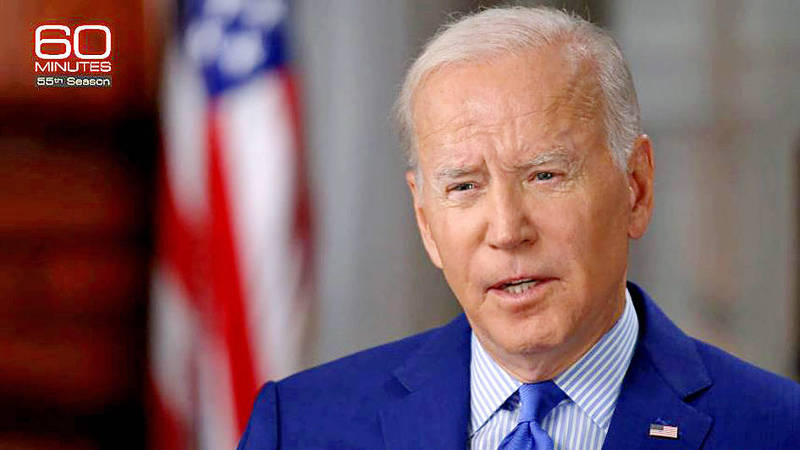《TAIPEI TIMES》 US would defend Taiwan, Biden says

US President Joe Biden speaks in an interview with the CBS program “60 Minutes” that aired on Sunday. Photo: Screen grab from CBS “60 Minutes”
COMMITTING TROOPS: The debate over ‘strategic ambiguity’ versus ‘strategic clarity’ in relation to US policy on Taiwan seems to have come to an end, a DPP lawmaker said
Agencies
US military forces would defend Taiwan if there was “an unprecedented attack,” US President Joe Biden said, underscoring the US’ commitment to the nation as Chinese incursions mount near its shores.
Asked in a CBS 60 Minutes interview broadcast on Sunday whether US forces would defend Taiwan, Biden replied: “Yes, if in fact, there was an unprecedented attack.”
Asked to clarify if he meant that unlike in Ukraine, US forces — American men and women — would defend Taiwan in the event of a Chinese invasion, Biden replied: “Yes.”
The interview was just the latest time that Biden has appeared to go beyond long-standing stated US policy on Taiwan, but his statement was clearer than previous ones about committing US troops to defend the nation.
Still, he reiterated earlier in the interview that the US’ “one China policy” had not changed.
“We agree with what we signed onto a long time ago. And that there’s one China policy, and Taiwan makes their own judgements about their independence. We are not moving — we’re not encouraging their being independent,” he said. “That’s their decision.”
CBS News reported the White House said after the interview US policy has not changed.
In May, Biden said “yes” when asked at a news conference in Tokyo whether he was willing to get the US involved militarily to defend Taiwan if China invaded.
“That’s the commitment we made,” he said then, before White House officials walked back his comments.
Tension is rising following China’s moves to intimidate Taiwan by firing missiles into the surrounding waters and flying fighter jets nearby over visits to Taipei by political figures including US House of Representatives Speaker Nancy Pelosi.
The US Senate Committee on Foreign Relations on Wednesday last week approved a bill that would formally designate Taiwan a “major non-NATO ally” and sell it more military hardware, even as the White House has expressed concerns over the legislation.
The CBS interview with Biden was conducted last week. He was in the UK for Queen Elizabeth II’s funeral yesterday.
In Taipei, the Ministry of Foreign Affairs yesterday expressed its “sincere gratitude” to Biden for “affirming the US government’s rock-solid promise of security to Taiwan.”
In light of China’s military expansion and provocative actions, Taiwan would continue to boost its self-defense capabilities, ministry spokeswoman Joanne Ou (歐江安) said.
Taiwan would deepen its partnership with the US and work with like-minded countries to safeguard the Taiwan Strait, as well as regional peace, stability and prosperity, Ou said.
Democratic Progressive Party (DPP) Legislator Lo Chih-cheng (羅致政), a member of the legislature’s Foreign Affairs and National Defense Committee, said the debate over “strategic ambiguity or strategic clarity” seems to have come to an end.
“It is hard to imagine that the US will just sit back” if a conflict were to break out in the Strait, but “Washington immediately sending troops to help Taiwan is also unlikely,” he said.
“Clear strategies and ambiguous tactics” have always been the position of the US, he added.
DPP Legislator Hsu Chih-chieh (許智傑) thanked Biden for taking a clear stance on supporting Taiwan.
“This [Biden’s speech] is like a shot in the arm for Taiwan and can effectively deter China from using force against the nation,” he said.
Taiwan would not provoke a war, nor does it fear conflict, he said, adding that the nation would continue to improve its national defense capability, and protect freedom and democracy together with other democracies.
Lev Nachman, assistant professor at National Chengchi University, said that “the biggest problem we have is that what the White House says is our Taiwan policy and what Biden says is our Taiwan policy contradict each other.”
“Even though this is not the first time Biden has made such comments, today’s context makes them hit extra hard because of the Taiwan policy act’s ongoing debate and the recent Chinese military drills in the Taiwan Strait,” he added. “The worry is that this will exacerbate Taiwan’s current high-tension moment rather than reduce it.”
Beijing yesterday said Biden’s latest comments “severely violate” Washington’s policy toward Taiwan.
Additional reporting by Hsieh Chun-lin
新聞來源:TAIPEI TIMES













